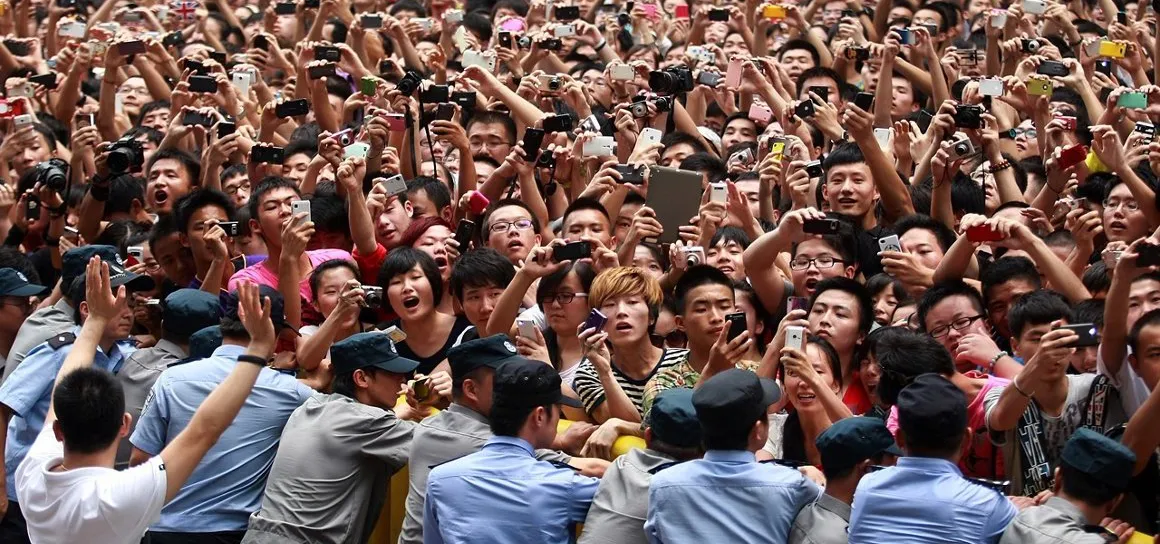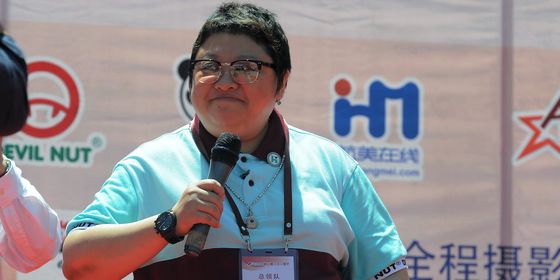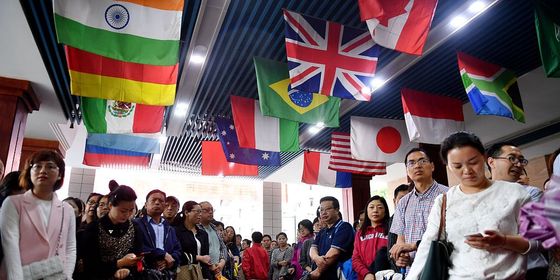Chinese fans are demanding a say in celebrities’ lives—and getting it
On the occasion of Wang Junkai (王俊凯)’s 16th birthday, fans prepared an extra-special gift for the lead singer of idol group TFboys: 42 million retweets, earning Wang a Guinness World Record in June 2015 for most reposts on Sina Weibo.
The power of Chinese celebrity 粉丝 (fěnsī, fans) to make—or break—a career has grown exponentially in recent years, spurred by a social media environment that channels the most vociferous public debate to non-sensitive topics, such as sports and celebrity. But the enthusiasm of netizens who lavish luxury virtual presents on their idols, and engage in heated rivalries with opposing fans, has apparently irked the censors: Last month, celebrity gossip and luxury lifestyles became the latest target for Beijing’s ever-widening crackdown.
So who are these extreme fans?
Celebrity fans can be divided into three categories: 路人粉 (lùrén fěn), literally “passer-by fans” who casually like a celebrity; 真爱粉 (zhēn ài fěn), “true-love” or superior fans, who put in a bit more effort; and finally 脑残粉 (nǎocán fěn), “brain-damaged fans,” who, along with 黑粉 (hēi fěn, “black” or anti-fans, i.e. haters) stir up the most trouble online.
It can be difficult to distinguish between them, though. In a Douban.com discussion on how to tell fan types apart, the most “liked” answer was: “It’s hard to tell, since it’s trendy for fans to assume the character of ‘passer-by fans’ or ‘anti-fans.'”

Nevertheless, these fans’ power and desire to exert it has created a “fan economy.” This is “a vaguely defined concept that involves sustaining a business model—usually in the media industry—by providing the products and services most likely to be consumed by fans,” critic Chen Xianjiang wrote in Sixth Tone.
True-love fans pay close attention to, or buy, products related to their idols. After actor Li Yifeng (李易峰) became the spokesperson of the Mocu Street app in August 2016, for example, nearly 10 million new users registered within five days. Companies and brands both at home and abroad are increasingly using Chinese celebrities as spokespersons and for commercial activities.
Li Jiajia, 23, a postgraduate in Beijing, calls herself a true-love fan of Li Yifeng. She told TWOC that she has watched every movie, TV show, andmedia appearance by the actor, and bought products, including an OPPO mobile phone, which he has advertised.
But this support, and revenue stream, comes at a considerable cost. Many fans feel entitled to an equal say in the business and personal lives of celebrities. An iFeng.com report illustrates how actors Zhang Yixing (张艺兴), Li Yifeng, and Zhao Liying (赵丽颖) had to deal with fans’ criticism of their agents’ skills; the pressure even forced Li’s agent to resign. In June, actor Chen Xiao’s (陈晓) agent also resigned, after a public campaign where fans accused her of incompetence.
In addition to attacking agents, fans also “protect” actors’ careers by “monitoring” their roles, and their co-actors and crew, in movies and TV shows. For example, fans of Wang Yuan (王源), another member of TFboys, protested his casting as the “stupid” character in two shows, compared to the “smart” roles offered to bandmates Wang Junkai and Yi Yangqianxi (易烊千玺). In May, fans of Zhao Liying protested that her leading man in upcoming TV shows You and Me in Time, Yan Chengxu (言承旭), was “washed-up”, “old,” and “not very handsome.” Even though these campaigns forced no change, they made headlines–and some to wonder what future decisions might be affected by the fickle fans.
Even relationships are not off limits. In June, actor Yang Zi (杨紫) made the mistake of leaving a message on the Weibo fan page of her boyfriend, “post-90s” actor Qin Junjie (秦俊杰), saying, “Thank you all for loving Qin. Hope you can also love me.” The backlash was immediate: “Yang was not welcome here and should stay among her own fans,” one respondent thundered; others called her “shameless,” and some even unsubscribed to the fan page in disgust.

A rabid fan of Qin asks Yang on Weibo, “Sister, is it because you don’t have any fans that you have to tresspass someone else’s fan group?”

“This woman sure knows how to play innocent—’please take care of me, please be kind to me’—even shamelessness has an extent you know,” another fan wrote
Though considering herself only a “passer-by fan” of Qin and Yang, Li Jiajia said she sympathizes with these ardent devotees. “Just putting myself in their shoes, I would not accept it if Li Yifeng falls in love with an actress I don’t like much. For true-love fans, few actresses are good enough for him. Even if Li Yifeng loves a particular actress, she’d better leave us alone.”
Apparently shocked by the negative response, Yang later apologized for her indiscretion—sparking a fresh debate among Qin’s fans over his qualities as a boyfriend (there are also CP粉, or “couple fans,” who have a near-obsessive interest in the success of certain celebrity pairings). In an ideal world, that should be a matter for Qin to decide, but in China’s hothouse environment, celebrity couples are increasingly finding they may not have much of a say.
Cover Image from xici.net













